Peter MALONE
Saturday, 09 October 2021 13:01
Don't Talk to irene
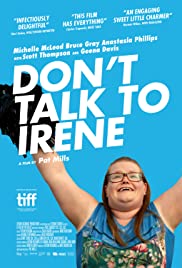
DON'T TALK TO IRENE
Canada, 2017, 90 minutes, Colour.
Michelle Mc Leod, Bruce Gray, Anastasia Phillips, Scott Thompson, Deborah Grover, Joan Gregson, Andy Reid, Aviva Mongillo, James Fry. With Geena Davis as guest.
Directed by Pat Mills.
This is an entertaining story about a girl, aged 15, Irene (Michelle Mc Leod), who has weight problems. She is criticised at school and mocked. But, she wants to be on the cheerleaders team.
Her mother is particularly protective of her, she herself having become pregnant at 16.
However, Irene does have some friends at school, particularly an androgynous boy/girl. But she is also criticised by an attractive young woman who should be her friend.
The novelty of the film is the presence of Geena Davis, mainly as a voice and in a poster. Irene idealising Geena Davis and her height, athletic prowess, her movie appearances. Geena Davis herself is rather deprecating but encouraging of Irene as she lies on her bed looking up to the poster of Geena Davis on her ceiling. There are also some clips from Geena Davis in action, especially in archery.
Irene and the other girl with her boyfriend are sent to a home for the elderly to do work instead of being expelled from school. Irene finds some friends with the elderly and decides to coach some of them in cheerleader moves. The group increases, the manager tolerates it, but Irene wants to audition for a television talent program which the residents watch. They don’t quite get to the audition but do a performance in the square at a town mall. Youtube, of course, saves the day. And Irene is invited to join the cheerleader squad, even to be on top of the pyramid.
The plot is rather similar to a Diane Keaton film, Poms, where she goes to home for the elderly, reluctantly, but energises a group into gymnastics and dance.
1. The title, the tone? The focus on Irene?
2. The Canadian town, the ironic comments about the town and its inhabitants, its way of life, shops, school…? Homes, the school, the residents for the elderly, the malls? The musical score?
3. The blend of reality and fantasy? Irene’s life, with her mother, her mother’s protectiveness and banning social media, her mother’s regrets, pregnancy so young, bringing up her daughter? Irene at school, bullied? The alcoholic teacher, Sarah as confidant? The cross-dressing boy? The poster of Geena Davis, her ambitions to be a cheerleader? Her uniform, painting the letters, her mother’s prohibition?
4. The role of Geena Davis, her status as a film star, the poster on the ceiling, the conversations with Irene? Urging her on, wise advice, never to quit? The glimpses and visuals of Geena Davis, especially archery?
5. The dispute, the principal, being sent to work at the residence? Irene preventing her mother knowing? The interview, the manager, the tasks? The arrival of Charlie and settling him in? Cleaning the wallpaper? The cook and his attitudes? The other students and their work, criticising Irene?
6. The range of residents, Ruth and her assertiveness, Millie and her meekness, ironic conversations, the meals, watching television?
7. Irene, recruiting them, the rehearsals, the use of the Chapel, the reaction of the manager? Charlie and his boxing, getting Irene to hit him? Her later punching the girl and her black eye?
8. The other recruits, the chef helping, the rehearsals, the performance, the moves, the comic touches? The TV show, Irene and her phone call, the plan for the audition, the manager preventing the use of the bus, Charlie stealing the key, the girl punching the tyre?
9. Irene’s mother, her reactions, her work as a driver, her regrets? Locking Irene in, Irene jumping out the window, the performance at the mall, the crowds watching, photographing, the success? And, on Youtube?
10. Irene, her achievement, her self-image, her mother helping, the moves? Geena Davis ending the conversation and moving onto the next client? Irene invited into the team, at the top of the pyramid?
11. The moral of the story – be who you are, acknowledge your talents and qualities, no matter what the difficulties?
Published in Movie Reviews
Published in
Movie Reviews
Saturday, 09 October 2021 13:01
Delbaran
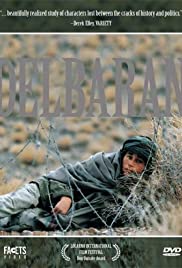
DELBARAN
Iran, 2001, 96 minutes, Colour.
Kaim Alizadeh, Rhamatollah Ebrahimi.
Directed by Abolfazl Jalili.
The film opens with striking scenery, deserts and mountains. The title refers to a crossing out in the desert, a pass between Afghanistan and Iran.
A young boy is travelling from Afghanistan into Iran, in search of work. He is escaping the war. (Interestingly, the film was released in 2001, the year of the American invasion).
The film shows various details of the boy’s life, the driver demanding money from him, his getting patronage from an old man in the village, working in the cafe, befriended by one of the women in the town, police inspectors arriving to question Afghan refugees, drug deals, robberies out on the road, the continual traffic on the highway.
The film immerses the audience in the place as well as in the life of the boy and the difficulties of growing up in such a remote location.
1. An Iranian perspective? Iran and Afghanistan border before the 2001 invasion?
2. The location, the rugged mountains, the desert, the border, the small town, the open plains? The buildings in the town? The roads? The musical score? The Delbaran crossing?
3. The opening, Kaim and his travelling, the truck, the driver, the difficulties, the argument about the payment? His landing at the crossing, getting a job in the cafe, Khan as his sponsor, the illegal immigrants? The police and the checks?
4. The boy, his age, eager to work, in the cafe, with the drivers, the mechanics, the need for repairs, his running to summon the mechanic, the arguments? His determination? The old lady, her support? The doctor, his ear infection? The police, his being taken, interrogated, allowed to run? This life as a substitute for his childhood?
5. Khan, his age, sponsoring the refugees? His relationship with the boy? His work, in the town, putting off the Inspector and his questioning about refugees? The other people in the town, the cantankerous mechanic and his complaints, his work? The visiting doctor and his kindness? The old lady defending the boy?
6. The traffic on the road, the trucks, accidents, trucks overturning, the need to pull them out? The bandits and the robberies? The drugs?
7. The visual impact of the film, the framing of characters and scenes, the vignettes and the cumulative effect as drama?
Published in Movie Reviews
Published in
Movie Reviews
Saturday, 09 October 2021 13:01
Verite, La/ The Truth
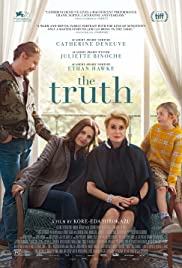
LA VERITE/ THE TRUTH
France, 2019, 105 minutes, Colour.
Catherine Deneuve Juliette Binoche, Ethan Hawke, Clementine Grenier, Manon Clavel, Alain LIbolt, Ludovine Sagnier, Jackie Berroyer.
Directed by Hirokazu Koreeda.
This is a French drama, a very French drama in tone, characters, family and interactions. Which, when we discover the credits, is more than surprising. The Truth was written by the celebrated Japanese writer-director, Hirokazu Koreeda, who has made many striking Japanese films, including the family portraits, Nobody Knows, I Wish, Our Little Sister, as well as winning the Palme d’Or in Cannes for Shoplifters. Here he has immersed himself in the life, so French, of the family.
The title raises issues of: what is truth? What is the truth?
The central character is Fabienne, a famous French actress, a career over many decades, a grand dame of cinema. And she is played, in very grand dame manner by that icon of French cinema, Catherine Deneuve. Which raises the questions immediately as to where we find the truth, on the screen, in performance, in playing to the public, in real life?
What is more, the actress has just published a memoir and her daughter, Limur, played by another icon of French cinema as well as of world cinema, Juliette Binoche, comes to share the celebration. She has escaped from her dominating mother by going to the United States, marrying an actor (Ethan Hawke), doing screenwriting and raising their daughter, Charlotte (Clementine Grenier). As Llimur looks at the memoir, she discovers more and more untruth, serious omissions of characters who are close to the actress, fabrications of what her life and her relationship with her daughter had been.
Much of the film, as in so many French films, is in intense conversations between the characters, Fabienne saying that she preferred to be a great actress rather than a good mother. Limur finds herself in a strange situation, Fabienne’s manager of forty years (omitted from the memoir) decides to leave and bequeaths the actress to the care of her daughter.
This is particularly testing because Fabienne has agreed to do a cameo role in a science-fiction film. The central character is played by young actress, Manon Clavel, a character who is ageless but keeps reappearing to her daughter at various stages of the daughter’s life. Fabienne is to be the daughter encountering her young mother, aged in her early 70s. Fabienne is tormented by a rivalry of a long dead actress, responsible in some ways for her death, comparisons being continually made. And, at rehearsals, arriving late and putting on a careless manner, there are tantrums and indulging whims, testing the director.
But, this encounter with her daughter, having to look at herself somewhat more truthfully having promoted the lies in the memoir, there is the possibility for some kind of mutual understanding, for the mother to reflect on her limitations as a parent, for the daughter to appreciate something of her mother and effect some kind of reconciliation.
Catherine Deneuve has been receiving top billing in films for 55 years – and, the temptation throughout the film is to wonder how much she is acting as Fabienne and how much is a glimpse into the life and career of Catherine Deneuve herself. And, it is always good to see Juliette Binoche on screen, an actress of great talent. And, Ethan Hawke is always interesting, this time a hack television actor, reforming alcoholic, but a delightfully doting father for his little daughter.
1. The title? Real life, acting and performance? The memoir, falsities? Changing the truth?
2. The Japanese director, his perceptiveness on French life and characters?
3. The opening, Fabienne interrogated by the journalist, her answers, arrogant, her influence, status in French cinema? The fact that Catherine Deneuve was performing?
4. The house, the garden, the traffic nearby, the exteriors, the interiors, the walks, the avenues? The studio and sets? The musical score?
5. Fabienne as a person, ego, snobbish, petty? Her career and its success? Her memories of Sarah and the rivalry? Sara’s death, her responsibility? Her relationship with her daughter, preferring to be a good actress rather than a good mother? Her daughter leaving her, going to America? Her relationship with her husband, his scruffy look, turning up? Fabienne’s sexual relationships, the casting couch? Her relationship with her chef, his position in the house? Luc, serving her for 40 years, finally exasperated and leaving?
6. The occasion of her memoir, exaggerating the published numbers, the family coming to be with her? The omissions, characters and their feeling hurt? Her altering facts and situations?
7. Limur, Juliette Binoche? Her husband, her daughter, living in the United States, her writing, his performance on television? Bonds? His career and drinking, giving up? His being a good father, playing with his daughter? The atmosphere of the visit, the memoir, the daughter looking at the book, critical of her mother? Her mother’s treatment of her? Her past, her father visiting? The issue of the performance in The Wizard of Oz – the later irony that her mother had seen it?
8. The meetings, the meals, the family gathering together? The chef and his role?
9. Fabienne and her past, the jealousy of Sara, Sarah’s death, getting parts away from Sara, relationship with directors?
10. Luc leaving, handing over the responsibility to Limur, her care for her mother, the ups and downs of moods, at the studio, the serving her mother?
11. At the studio, the science fiction in space, the character of Amy at various ages? The range of actresses? Fabienne as Amy at 73? The rehearsals, Fabienne and her tantrums, performance, improvising, her pouting? The difficulties? The mediation of the director? Her experience with her daughter – and wanting to do a re-take to incorporate that feeling?
12. Fabienne, having to face realities, the walk with the dog, the restaurant, observing the Chinese family and the celebration, Luc and his family? Her talking with Manon, more gracious towards her?
13. The effect of the visit on the daughter and her husband, their talk, his drinking with Fabienne, the reality of his career?
14. The portrait of Charlotte, her love for her mother, her grandfather, with Fabienne, on the set in seeing the young actress and discussing with her?
15. The husband, his plans?
16. The experience on Limur, the memoir, her past, going back to America, the exploring of the mother daughter relationship?
17. The characters coming to come to some kind of resolution – openness towards the future?
Published in Movie Reviews
Published in
Movie Reviews
Saturday, 09 October 2021 13:01
21 Bridges
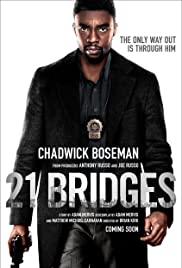
21 BRIDGES
US, 2019, 99 minutes, Colour.
Chadwick Boseman, Siena Miller, J.K.Simmons, Taylor Kitsch, Stephan James, Keith David, Alexander Siddig.
Directed by Brian Kirk.
This is a very strong police drama which takes place overnight. And the 21 bridges? We are told that there are 21 bridges out of Manhattan to the other boroughs of New York City. Which means, that when criminals are on the loose in Manhattan, the 21 bridges need to be blocked to apprehend the fugitives.
The film opens with a funeral, a police officer killed in the line of duty, mourned by his widow and young son, African-Americans?. Setting the tone for the film, the priest is quite harsh in his interpretation of murder and God’s subsequent avenging mood.
The transition is instant, Andre Davis, the young son, has grown up, is an expert detective, has used guns in apprehending criminals, is being investigated by Internal Affairs, defending himself that he has not initiated any of the shootings which have resulted in deaths.
Which sets the situation for crime and detection quite briskly and strongly. In fact, the rest of the film which is investigation and pursuit, is also treated briskly and strongly.
The crime we are shown in some detail. Two Manhattan thugs (Taylor Kitsch, Stephan James) are commissioned to raid a store with a stash of drugs, discovering that there are far more containers than they were told, police suddenly and unexpectedly turning up and the men, desperate, in a spree of shooting, and many dead police.
Andre is sent in to take charge of the investigation, FBI agents intervene and he is given until 5 am, six hours, to bring in the suspects. Audience tension is increased by the continual indication of the times and time passing. The local commander of the precinct, J.K.Simmons, is tough and initially unresponsive to Andre. Another member of the precinct, Frankie Burns (Sienna Miller) is assigned to shadow Andre.
What makes the drama interesting is following Andre, his skills, shrewdness in evaluating information that comes in, following leads, interrogations, tracking down the two men. And, in the meantime, we are shown some detail about the two, learn their backgrounds in Manhattan as well as in Afghanistan, see the bonds between the two as well s the tensions (one is white, the other is African-American).
And, as with this kind of drama, there are desperate confrontations, Burns taken hostage, Andre bargaining. And, as also with this kind of drama, there is also a significant twist in who hired the two men in the first place.
Yes, we have seen many variations on this plot and themes – but, here is another which keeps our attention, is effectively paced, a worthwhile version of the themes.
Chadwick Boseman, who achieved international acknowledgement as Black Panther (and appearances in many of the Marvel action stories) but who has portrayed significant African-American? characters: sportsman Jackie Robinson (42), singer James Brown (Get On Up) and legal expert, Thurgood Marshall (Marshall), is solidly serious as Andre Davis. British actress, Sienna Miller, is Frankie Burns.
The director, Irish Brian Kirk, has credible credentials directing episodes of Luther, Penny Dreadful, Game of Thrones.
Solid police action drama.
1. The title? The 21 bridges out of Manhattan?
2. The city, locations, police precincts, the drug robbery? The streets? Central information? Clubs, apartments, locations for confrontation? The musical score?
3. Police drama, criminals, authority, local police, the FBI? Investigation?
4. The action taking place overnight? Indications of time passing? Tension? The 5 o’clock deadline?
5. The African- American experience? The detective, his father, skills, detection? The opening with the funeral, the little boy, his mother, the dead father, the tribute, the severity of the priest, the image of the avenging God?
6. Internal affairs, Andre and the questions, his reputation, shooting, response rather than initiation? His reputation around the city?
7. The crime, Ray and Mike, arriving, going into action, the guard, the weapons, the drug stash, more than anticipated, their taking the drugs? The arrival of the police, the number of police, the deadly shootouts, their escape? The car crashed?
8. Andre in charge, his jurisdiction, the FBI agents, the time limit? Precinct commander, hostile attitude towards Andre, the death of his men? Reluctant agreement? (And the perspective when the twists were revealed?).
9. Frankie Burns, assigned to Andre, her background, child, the phone, role as an officer?
10. Andre. skill in detection, following leads, the crash of the car, trapped on Manhattan with the lockdown, images, the control at the central information? Continually verifying information, phone contact? Going to clubs, the girlfriend, going to homes, getting further information? Motivations?
11. The men, the contact, puzzling about who hired them? About the police arrival? Going to the authority, the money, the advice for the money laundering? Visiting him, his elegant style? The shooters at the door, the injury to his eye?
12. Ray and his character, the background, Mike’s brother, Afghanistan, protection? Life in the neighbourhood? Mike, the younger brother, stepping into his brother’s shoes? On the run, the cars, the chase, the being caught, shootouts, Ray and his death?
13. Mike, character, being pursued, Andre catching up to him, his holding the gun on Frankie Burns, her urging Andre to shoot?
14. The eventual discussions, Andre and his power of persuasion? Mike fleeing, the car, the hit? The appeal? The USB stick, is trying to find out information, looking, the 85th precinct? Andre getting the USB?
15. The twist, the role of the 85th precinct, the officer in charge, his explanations to Andre, the port payment, the men on the take, the right to a comfortable life?
16. Police corruption, the FBI, deaths? Andre the house, the confrontation with the leader, his attempt to shoot, his death? The truth about Burns, her arrival? Arrested?
17. Andre and his achievement, living for another day?
Published in Movie Reviews
Published in
Movie Reviews
Saturday, 09 October 2021 13:01
In My Blood it Runs
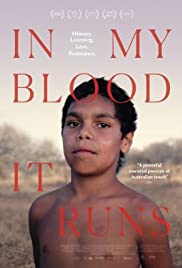
IN MY BLOOD IT RUNS
Australia, 2019, 84 minutes, Colour.
Dujuan Turner, Carol Turner, Megan Turner.
Directed by Maya Newell.
The first question to ask is who is the “my� of the title. In fact, it is a nine-year-old boy, turning 10, Dujuan Turner. He is an aboriginal boy, living in Alice Springs, desiring to return to his homeland, beyond Alice Springs.
And he makes quite an impact on the audience. The camera likes him. He is quite a screen presence, something of a young screen hero. He also seems wise beyond his years as we listen to his well-articulated opinions and principles, to be a good man, not drinking, not hurting anyone, his good knowledge of English, and his desire and efforts to speak his own language, Arrernte. The audience learns a great deal listening to him, watching him with his grandmothers (and, it is often said, anyone brought up by a grandmother cannot be all bad!), at a white school being taught about Captain Cook, at an indigenous school, learning about traditions (and an alternate perspective on Captain Cook).
And what is it that runs in Dujuan’s blood? It is indigenous life, thousands of years old, passed on from generation to generation for so many generations, a consciousness of stories, a consciousness of what we might call creative myths, interpretations of the world. But, in Dujuan’s blood, he recognises something of a life force that he has inherited. He is a healer. And that also is his tradition. And we see him at work with his grandmothers and elderly relatives, drawing the pain from them and thrusting it away.
This film takes its place with so many other contemporary films about indigenous people. In 2019, audiences were challenged by the experiences of football player and Australian of the Year, Adam Goodes. But, this time it is the very young generation that audiences are asked to consider. They have been born into a different world – and we see Dujuan and his grandmother lining up at the supermarkets for checkout, with their mobile phones, 21st-century almost-universal style of living.
However, there is the innate desire to be one with the land, to know one’s place, the pain of leaving it, the desire to return, for Dujuan to leave Alice Springs and the house there (contrasting with the majority of local neat comfortable homes), a life that is only temporary.
There are scenes where Dujuan returns to his homeland, to his relations, to a freedom from Alice Springs constrictions, to a different way of learning. Later, when the audience realises that there has been a singular absence of male figures so far in the film, father-figures in his story, he goes to Borroloola to meet his father, bond with him, live with him. His father is quite a sympathetic figure, conscious of his own failures, but earnest in his care for his son.
There have been many documentaries on aboriginal issues, on indigenous culture – but this one is extraordinarily winning, Dujuan and his wonderfully winning personality communicating his hopes.
Published in Movie Reviews
Published in
Movie Reviews
Saturday, 09 October 2021 13:01
White, White, Day, A
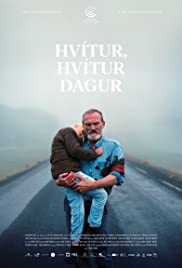
A WHITE, WHITE DAY
Iceland, 2019, 109 minutes, Colour.
Ingvar Sigurdsson, Ida Mekkin Hlynsdottir.
Directed by Hlnur Palmason.
Iceland has a Scandinavian heritage. It has the clouded atmosphere and temperatures of northern Europe. The landscapes are rugged, coastal and mountainous. And the population is small, something like an island nation village. The Icelandic film industry is not prone to comedy.
And this drama is certainly not comic. It is sombre, often grim, white, white days indicating snow but a quotation, Source Unknown, at the film’s opening, suggests that when the day is white, when sky and earth are indistinguishable, ghosts communicate with the living.
The initial focus is on a car driving on an icy road, a comparatively long sequence, and then the car skidding, crashing into the guardrail and disappearing. In fact, this episode will be highly significant as the drama unfolds.
Then the director uses a telling device, the fixed camera on a farm house which is being repaired, ponies on the property, mountains in the background – then a succession of still shots, the house in night and day, in different seasons, grounding our attention in this environment. We spend a lot of time in the interiors of the house, especially as it is being repaired and renovated, but also some time at the local police station, on the roads and in the tunnel under the mountains, in the countryside, and by the sea. We experience the Icelandic atmosphere.
Which is important because the central character, Ingimundur (a powerfully persuaded persuasive performance, often menacing, by Ingvar Sigurdsson), a local policeman, his renovating the house for his daughter and his granddaughter, Salka. We come to realise that he is grieving for his dead wife, killed in that car accident. He holds in his feelings, putting all his energies into the house. He does have some help in counselling but is resistant. Ultimately, reacting badly to the questions put to him (by Skype because of weather difficulties and travel), he erupts. And he takes it out on the local police, another violent eruption. And Salka, with whom he spends a lot of time, cheerfully bonding with her, but then she experiences the brunt of his outbursts.
A significant part of his grief is that he feels his wife had kept secrets from him. And the latter part of the film finds Ingimundur goaded into confrontation, quiet rage, and emotional collapse.
As might be expected, there is no neat or happy ending in this kind of Icelandic drama. Rather, Ingimundur has gone through grief, traumatic consequences, emotional collapse, but also steps towards apology, reconciliation, some possibility for peace in his soul and in his life.
1. An Icelandic story? Contemporary drama? The tradition of sombre Scandinavian storytelling? Situations, characters, interactions, potential for violence?
2. The title, the quote from the unknown source, ghosts speaking from the past on white days?
3. The opening mood, the car on the icy road, the audience observing, the sudden swerve, crash, disappearance? The significance of this accident for the rest of the drama?
4. The device of focusing on the house, the fixed camera, the ponies, cars arriving, day and night, the changing seasons? The mountain background? The significance of the house throughout the film? Repair, renovations?
5. Ingimunder and his story? Age, policeman, his daughter and care for her, renovating the house for her and her daughter, his dislike of her husband? The effort of working on the house, interiors, on the roof? His minding his granddaughter? Enjoying her company?
6. Salka, her age, lively, her relationship with her mother, with her father, with her grandfather, her presence in the house? Keeping her grandfather company? Driving with him?
7. Ingimunder at home, jogging, playing football, interactions with the other men? Friendships, talking, storytelling, the showers? His visit to the police station, family relationships, tensions? His later outburst against them, putting them in the cells after the fight? His attempt at an apology?
8. The gradual revelation of his suspicions of his wife? The psychologist, the questions, his answers, the interview via Skype, his outburst and destroying everything? The discussions with his friend, his friend’s infidelities? Ingimunder and his declaration of his suspicions?
9. Going to the house, confronting the man, driving into the countryside, with the rifle, the threats? The grave, their sitting on the sides? His forcing him into a confession? To describe the wife, her beauty, the sexual experiences? The man and his confession? Upset? Getting away?
10. The surprise of his accosting Ingimunder, Salka in the back after being upset with her grandfather and his outburst, the man and his knife, stabbing Ingimunder, Salka screaming? The car, going through the tunnel?
11. The consequences of this experience, going back to the house, apologising to Salka, the popular making peace with the police? The cathartic experience and his sitting in the house, calm? His future and some kind of peace?
Published in Movie Reviews
Published in
Movie Reviews
Saturday, 09 October 2021 13:01
Agatha Christie's Poiorot Mrs McGinty's Dead
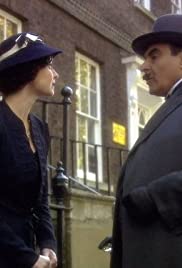
MRS McGINTY’S DEAD
UK, 2008, 93 minutes, Colour.
David Suchet, Zoe Wanamaker, Joe Absalom, Richard Hope, David Yelland, Sarah Smart, Racquel Cassidy, Richard Dillane, Simon Shepherd, Emma Amos, Bill Geraghty, Ruth Gemmell, Mary Stockley, Paul Rhys, Sian Phillips, Catherine Russell, Amanda Root, Richard Lintern.
Directed by Ashley Pearce.
As always, there is a complicated scenario for this Agatha Christie murder mystery. Mrs McGinty? is a cleaning woman and her nephew is accused of her murder. Inspector Spence does not believe he is guilty and asks Poirot to help. Poirot is also persuaded.
This means Poirot going to a country town, very uncomfortable accommodation, the range of eccentric characters, several couples for whom Mrs McGinty? cleaned. And, for extra complications, Ariadne Oliver is also in town, collaborating with the young man who is writing a play based on one of the detective stories – and they clash.
Poirot investigates as usual, does a range of interviews, discovers an article in a newspaper that Mrs McGinty? had read – and was ready to expose somebody’s true identity. There are various misunderstandings, drive scenario where there is a second murder, and Poirot seen behind the suggestions that the murderer was woman to the fact that the murderer was a man.
As always, a strong cast, especially of British character actors, including Sian Phillips and Paul Rhys.
1. The popularity of Agatha Christie mysteries? The television series? David Suchet as Poirot?
2. Poirot and Scotland Yard? The request to investigate, the man on death row? Going to the village, the uncomfortable accommodation, social gatherings, the range of people? Interviews? The final expose?
3. Inspect dispense? Friendship with Poirot? Doubting James Bentley’s guilt? Poirot interviewing him? His relationship with Mrs McGinty? Quiet type, writing problems? Innocent? The young woman attracted to him and supporting him?
4. Poirot visiting the town, Mrs Summerhayes and her background, unhealthy housekeeping, her severe husband, the Major? Poirot and the cold, the food and the coffee? Mrs Summerhayes coming in and out all the time?
5. Mrs Oliver, her presence in the town, Robin Upward and his helping with writing the play on her novel? The humorous scenes, his suggestions, her rejections? Frustrations? Her various theories for Poirot? Going to the theatre? Driving Poirot around?
6. The range of characters that Poirot met? The social? The couples? The doctor and his neurotic wife and her medication? The Carpenters, Eva and her snobbery? The Burches? Mrs Upward, in her wheelchair, depending on Robin?
7. The various tangles? The relationship with Mrs McGinty? and her doing the cleaning?
8. The information about the photos, in the newspaper, Poirot visiting the author and her not worried about accuracy? His producing the photos? Mrs Upward and the identification, misleading? The background story of the two women and their involvement in murders?
9. Mrs Upward recognising one of the women, the three phone calls to the women, Mrs Summerhayes arriving, the others not going? Presumption that the murderer was a woman? Poirot’s steering the revelations that the murderer was a man?
10. The background of the men, their personalities, relationship with their wives?
11. Poirot, the revelation about the photo, the mother, going to Australia, the book with the inscription, the photo in Mrs Summerhayes drawer, her thinking that it was her mother?
12. The unmasking of Robin, his background, theatre, his contriving the situation to kill Mrs Upward, with Mrs Oliver, going back into the house, killing her, the phone calls and the pretense, the mistake about the lipstick, Mrs Carpenter’s scent?
13. The young woman, Poirot talking with her, her connection with the photo, mistaking Mrs Upward and not shooting her? James Bentley and his being released, the reunion?
Published in Movie Reviews
Published in
Movie Reviews
Saturday, 09 October 2021 13:01
While New York Sleeps
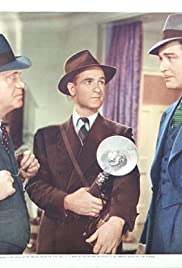
WHILE NEW YORK SLEEPS
US, 1938 63 minutes, Black-and-white.
Michael Whalen, Jean Rogers, Chick Chandler, Robert Kellard, Joan Woodbury, Harold Huber, Marc Lawrence, Sidney Blackmer, William Demarest Cliff Clark, Edward Gargan.
Directed by H. Bruce Humberstone.
A B-budget, supporting feature, a time passer. While there is a murder mystery, there is a strong facetious tone throughout the film, especially with several of the characters involved in elaborate practical jokes – and, one of them, the owner of a nightclub, Marco, played by Harold Huber, continually laughing uproariously at the pranks that he pulls.
While this is a police investigation, the police are too straight up-and-down, leaving the investigation to a top newspaper reporter and his sidekick, Michael Whalen and Chick Chandler.
There have some are murders of couriers carrying bonds. Then a man from a finance company is alleged to have committed suicide. The reporter does not believe this, persuading his editor to print an accusation of murder rather than suicide. The reporter has gone on holidays to write a play – but hurries back for the investigation, continually clashing with the police. And his sidekick takes a lot of important photos.
The main setting is the nightclub, Marco, his sinister sidekick, Happy (Marc Lawrence looking sinister as he did 40 years later in Foul Play – and a career that lasted 70 years, from 1932 to 2003). There is a singer played by Joan Woodbury, a dancer played by Jean Rogers who has a boyfriend from out of town, Robert Kellard. There is also the sinister presence of Sidney Blackmer. On the other hand, there is the enjoyable presence of William Demarest as the rather slow attendant at the bar.
So some romantic complications, a prank set up with Marco to be shot by a blank – but, of course, the villain taking opportunity to shoot him (and he was the receiver of all the stolen bonds).
H. Bruce Humberstone was an actor, a director with a wide range of films from Charlie Chan films in the 30s, to thrillers, then to musicals and comedies.
Published in Movie Reviews
Published in
Movie Reviews
Saturday, 09 October 2021 13:01
Crime Doctor's Diary, The
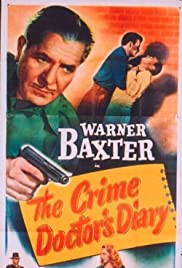
CRIME DOCTOR’S DIARY
US, 1949, 61 minutes, Black-and-white.
Warner Baxter, Stephen Dunne, Lois Maxwell, Adele Jurgens, Robert Armstrong, Don Beddoe, Whit Bissell, George Meeker.
Directed by Seymour Friedman.
This is the final film in the crime Crime Doctor’s all murder mysteries. There were based on a popular radio series.
Warner Baxter portrayed psychiatrist Dr Robert Ordway, some time in a parole board, collaborating with the police in solving mysteries. Although the running time is brief, the plot is quite complex in this last film. It has the advantage of being in the early screenplay by Edward Anhalt who, the next year, was to receive an Oscar for Panic in the Streets and, during the 1960s, for Beckett. He had a prolific career, many fine films, during the 1950s to the end of the 1980s.
The setting is very contemporary, some companies who had record stocks and where customers could phone in and request the playing of particular records. One of the companies suffered from an arson attack, one of the employees imprisoned for three years. He is played by Stephen Dunne. There are two women in the cast, one who works in the company, a rather typical-seeming heroine, played by Lois Maxwell who was to be Miss Moneypenny in the James Bond films with Sean Connery and Roger Moore. The other is Adele Jurgens, who had a vaudeville background and often played the glamorous femme fatale.
However, the film is stolen by a very interesting and sympathetic performance by Whit Bissell, playing the younger brother of the company’s head, wanting to compose a song, the same song playing all the time, trying to record quietly at the company itself – but interrupted. And this is a device to reveal who the murderer is as the recording kept going, the murderer unawares until later.
A good end to quite an entertaining series.
1. The popularity of the Crime Doctors series? The last of the series? The style of murder mysteries and investigation of the 1940s? Based on a radio program?
2. The 1940s, the record company, phone calls, records played for customers?
3. Dr Robert Ordway, Warner Baxter in the ten films, his skill as a doctor, psychiatrist, involvement in the investigations? In collaboration with the police?
4. Carter, accused of arson, three years in prison, the support of the warden? His work with Dr Ordway? The record company, his job? The burning of the station? His boss? Jane, the attraction, her meeting him at the prison? Helping him settle?
5. Philip Bellum, the company, Pete as his brother, simpleminded, his song on the composition, playing it in the diner, at the studio, doing the recording, the interaction by Carl Anson, Anson and his irritation? Later discovered dead?
6. Steve going to see Inez, her working for the other firm, Goldie as the boss? Her style is a femme fatale? Jane arriving, seeing Steve kissing in as?
7. The background of Carl Anson, exploiting the company, double deals with Goldie?
8. Pete, the recording, Jane listening to it? Her not wanting Steve to listen?
9. Philip, his concern, the company, supporting his brother?
10. The recording, the revelation, Jane and her killing Anson? Her obsession with Steve? Her burning the studio?
11. A satisfactory solving of the murder mystery? Unexpected? The end of the series?
Published in Movie Reviews
Published in
Movie Reviews
Saturday, 09 October 2021 13:01
Crime Doctor's Gamble, The
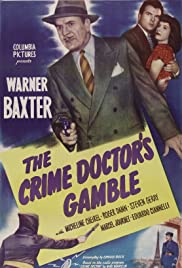
THE CRIME DOCTOR'S GAMBLE
US, 1947, 66 minutes, Black-and-white.
Warner Baxter, Roger Dann, Steven Geray, Marcel Journet, Eduardo Cianelli.
Directed by William Castle.
This is one of the later entries into the Crime Doctors series, B-budget mysteries from Colombia Studios, featuring Warner Baxter as Dr Ordway, psychiatrist, with a skill in detecting. The series was based on a successful radio program.
Most of the films have an American setting, especially the doctor’s office. However, he is in France after the war giving a lecture and hosted by the head of the prefecture in Paris who takes him to a number of nightclubs, then introduces him to a case where a young man is accused of murdering his father and who also fears for his sanity. He is engaged to a young woman – who has appeared with her father at the nightclub, the father a knife thrower.
There are complications with mental health, with the dead father and his disinheriting his son, the dead father having had dealings with the knife thrower in the past and disapproving of his son marrying the daughter, and the presence of the estate manager, an ingratiating type. But, there is also the issue of artworks, the painting of fakes, their being auctioned.
This time, Dr Ordway is involved in a physical fight with the villain, something which he normally does not do. And, at the end, there is the expected revelation, perhaps not such a surprise as the question in be asked, are there any other suspects who could be the villain?
1. One of the series of the Crime Doctor, Dr Ordway, psychiatrist, Detective?
2. A story in Paris, the doctor going to give the lecture, the atmosphere of Paris? The lecture, the head of the Prefecture, going to the nightclubs, the dancing, the knife throwing? The prefect and his case, Henri and his visit, the death of his father, his blaming himself? Thinking he was insane? Dr Ordway and his assessment?
3. Henri, Mignon as his fiancee, her father the knife thrower, his previous dispute with Henri’s father, the father not wanting him to marry Mignon? The death of his wife? Mignon having to step in as the target for the knife throwing? His illness? Collapse and death?
4. The estate manager, pleasant manner, the will, Henri excluded, the issue of paintings?
5. The art shop, the manager, the classic paintings, the copying, the artist and his skills? Dr Ordway’s visit, his being hit on the head?
6. Henri and Mignon, marriage, inheriting, but no cash? Dr Ordway’s suggestion that they auction everything from the house? The issue of the painting? The experts? The
revelation that it was a fake? The estate manager, his presence, his deciding to buy the painting as a memento? Giving the money to the couple?
7. The doctor, the artist and his death, the fight, physical, with the opponent? And the unmasking of the estate manager as the mastermind, buying the fake, but having the actual painting?
8. Some criticising this is the least impressive of the series? But, the exotic post-war setting?
Published in Movie Reviews
Published in
Movie Reviews